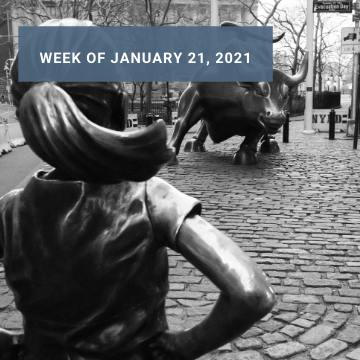Here’s what happened this week in IT news.
Join our community and find your next job or expert in IT
Amateur traders take on Wall Street’s old guard
The Internet can be a fascinating place. And especially Reddit. Mix online stock trading with a pinch of cancel culture and a good amount of memes and, boom: a bunch of Wall Street big shots lose millions in a matter of hours.
Retail investors using low-cost, online trading platforms like Robinhood organised through the ‘WallStreetBets’ subreddit to do something they had been wanting to do for a while now: get back at hedge funds and other traditional investors who make money by betting on failing companies (aka shorting).
These amateur traders, who see themselves as part of a new wave of anti-establishment investors, went on to inflate the stock price of GameStop, a now-failing American brick-and-mortar videogame store. Wall Street had borrowed many of the company’s stocks, sure these would go down in price and they’d be able to make a profit upon returning them.
Ouch. Certainly a clear reminder of the power that the virtual world can have over the real one.
Davos goes virtual
Like pretty much any other large event whose organisers sport a bit of common sense, this year’s gathering of the World Economic Forum is being held fully online. Its focus this time around? Surprise, surprise. You guessed it — pandemic recovery.
Specifically, the organisation consulted world business leaders ahead of the start of the talks conference talks about how technology should be used to help reset our society, economy and business environment.
Cloud and collaboration tools to strengthen community ties and help us predict and address health crises. Accelerated digital transformation to keep improving business models and ultimately people’s lives. Widespread use of AI to automate repetitive tasks and allow businesses to focus on adding real, high-end value.
The underlying theme: prioritising the common good.
A five-year timeline for AI in the enterprise
A newly published Gartner report aims to do something at which most tech predictions tend to fail: getting too specific with the time estimates.
The study looked at the unintended ethical and social repercussions of AI adoption and then provided recommendations on what business should do to address them.
By 2025, our world could look quite scarier than it does today in terms of privacy and cybersecurity. Large-scale AI models will be concentrated in the hands of 1% of vendors. Deepfakes will be so common companies will have to conduct regular employee trainings on how to spot them. About 75% of workplace conversations will be analysed to add organisational value and assess risk.
Learn more about AI: 5 Online Courses to Get You Up-To-Speed with AI
The most obvious routes for businesses to take include setting up ethic boards at companies that sell or use AI and establishing guidelines for responsible AI consumption.

Check out more of our interviews from our podcast episodes.

